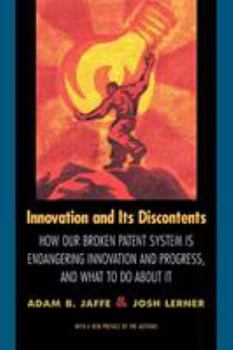Innovation and Its Discontents: How Our Broken Patent System Is Endangering Innovation and Progress, and What to Do about It
Select Format
Select Condition 
Book Overview
The United States patent system has become sand rather than lubricant in the wheels of American progress. Such is the premise behind this provocative and timely book by two of the nation's leading experts on patents and economic innovation.
Innovation and Its Discontents tells the story of how recent changes in patenting--an institutional process that was created to nurture innovation--have wreaked havoc on innovators, businesses,...
Format:Paperback
Language:English
ISBN:0691127948
ISBN13:9780691127941
Release Date:January 2007
Publisher:Princeton University Press
Length:256 Pages
Weight:0.85 lbs.
Dimensions:0.6" x 6.2" x 9.3"
Customer Reviews
1 rating
Eloquent
Published by Thriftbooks.com User , 20 years ago
This book presents a clear, concise and convincing argument that subtle changes in U.S. laws starting in 1982 have broken a patent system that was working reasonably well until then. It will be more effective at convincing the average person than most other attempts have been, both because of its style and because it shows that the changes which broke the system shouldn't have been expected to help anyone other than patent lawyers. Their analysis will be useful in helping to avoid the takeover of other agencies by special interests. Their description of how the system should be fixed is less impressive. Their summary of proposed changes strangely fails to include undoing the change in appeals court jurisdiction which they suggest was a primary cause of the problems. Their argument in favor of patenting software, business practices, etc. is more radical than they seem to realize, as it appears to imply that patents should also be extended to mathematical theorems, yet they act as if the burden of proof should be on their critics. Their confidence that a traditional patent system is better than no patents is unconvincing (but they do a good job of explaining why it is hard to know what the best system is). They support their position by a few examples such as Xerox, whose copier wouldn't have been invented as it was without patent protection. But it's much harder than they imply to determine that a copier wouldn't have been invented some other way a few years later.





